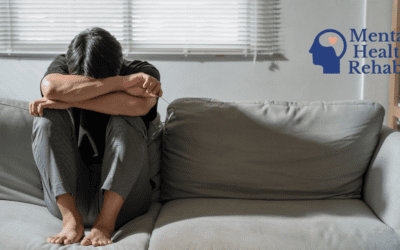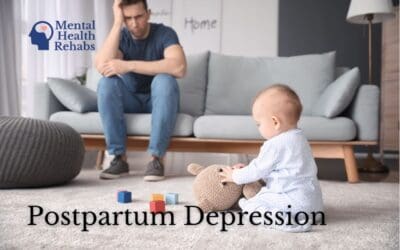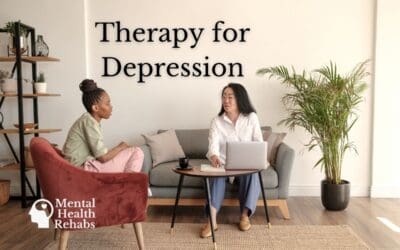Postpartum Depression.
According to the CDC, approximately 1 in 10 women experienced Postpartum Depression (PPD) last year. Another publication in the National Library of Medicine states that 1 in 7 women develop PPD. While the exact numbers are not completely clear, what we do know is that this condition impacts a large number of new parents, including approximately 4% of new fathers. Addressing this common, preventable, and treatable condition requires understanding what it is.

What is Postpartum Depression?
By definition, postpartum depression is a form of depression that presents during the first year following the birth of a child. However, the birthing person is not the only person who can be affected by this condition. Fathers, partners, and adoptive parents can also develop PPD. Symptoms of Postpartum Depression include:
- Excessive crying
- Anger
- Withdrawing or isolating
- Lack of connection with your baby
- Fear or thoughts of hurting your baby
- Guilt or doubt regarding the ability to care for your baby/being a parent
PPD vs. “Baby Blue”
Baby blues is a colloquial term used to describe the days following birth when there are a lot of hormones that cause symptoms such as:
- Mood swings
- Feelings of sadness and anxiety
- Frequent crying
- Loss of appetite
- Insomnia
Different from PPD, the “baby blues” are completely normal and should go away in a few days. If they persist for more than a couple of weeks, it may be more than baby blues.
Postpartum Psychosis
On the other end of the spectrum, postpartum psychosis is a severe condition where postpartum depression has evolved into a point of psychosis. This condition affects approximately 1 in 500 women after giving birth. Signs of Postpartum Psychosis include:
- Hallucinations
- Delusions
- Manic episodes
- Depression
- Lowered inhibitions
- Restlessness
- Thoughts of self-harm or harming the baby
The Stigma of Postpartum Depression
The often impossible societal expectations placed on mothers (and parents, in general) can make it difficult to admit when they need help. If they ask for help or admit that they cannot handle everything on their own, they may fear that they will be treated as a “failure” or that they are not suited to be a mom. Moreover, they may be fearful of their children being taken away due to a report to child protective services (CPS). Many women may even feel fear about being honest about their struggles with their own partner.
If women cannot feel comfortable being honest with their struggles, then they will never be able to get help. Without help, the situation may worsen to a point that is dangerous for the parent and child(ren). The best thing our society can do for families is to provide safe spaces for parents to be honest about their experiences and feelings without fear of judgment. Next, familiarize ourselves with local resources for treating and managing postpartum depression so that we can direct parents to the help they need.
PPD Treatment
Postpartum Depression is completely treatable. Whether you are looking for help for yourself or a loved one, start by reaching out to a healthcare provider immediately!
Treatment should always be approached on an individual basis. In most cases, psychotherapy (talk therapy) is going to be the primary mode of treatment. It is recommended to search for a therapist who is experienced in working with families and new moms. In other cases, medication may be used in combination with talk therapy. Contrary to popular belief, many medications are safe to take when breastfeeding and the benefits far outweigh the potential effects.
Another important factor in treating (and preventing) PPD is having a solid support system. It really does take a village. New parents should feel comfortable asking for help when they struggle to accomplish daily tasks such as bathing, cooking, cleaning, etc. No one should have to do this alone. It is completely normal and okay to need help.
Sources
https://www.cdc.gov/reproductivehealth/depression/index.htm#how
https://www.ncbi.nlm.nih.gov/books/NBK519070/
https://www.womenshealth.gov/mental-health/mental-health-conditions/postpartum-depression
https://hypnobirthing.com/fourth-trimester/%e2%80%8b%e2%80%8bhow-to-prevent-postpartum-depression/
https://www.nhs.uk/mental-health/conditions/post-partum-psychosis/
Related Articles
6 Factors You Shouldn’t Ignore When It Comes to Mental Health
It's easy to sideline mental health amidst daily commitments and routines in our fast-paced world. Often, we only recognize its significance when facing burnout or health issues. The gravity of this oversight is evident in the fact that, as of 2021, 9.2 million U.S....
4 Postpartum Depression Treatment Options Parents Should Consider
Women undergo a radical and rapid hormone change in the weeks immediately preceding and following childbirth. These fluctuations can result in the mood disorder known as postpartum depression (PPD), which is estimated to affect around one in five mothers. Unlike “baby...
8 Recommended Types of Therapy for Depression
Depression is a mental health disorder that affects millions of people worldwide. It can significantly impact an individual's daily life, making it difficult to carry out basic tasks, work, and maintain relationships. While medication can help alleviate symptoms,...
6 Tips on How to Stop Self Harm
Self-harm is a serious and often misunderstood problem that affects many people. If you or someone you know is struggling with self-harm, it's important to know that help is available. People who self-harm often experience mental health issues like depression,...
Don’t Struggle Alone.
Get Help Today.
Reaching out for help for yourself or a loved one can be overwhelming and stressful, but it doesn’t have to be. If you are struggling to find the right help, or even know where to get started, please feel free to call our 24/7 helpline.
Begin your mental health journey right now!





